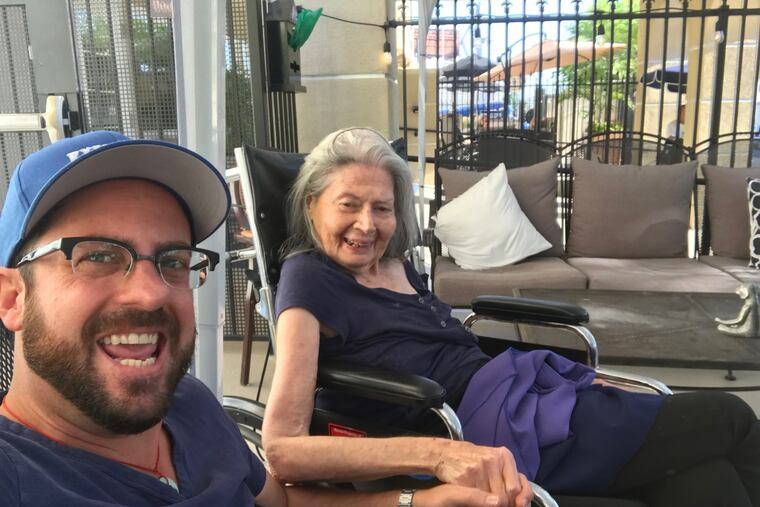Comedians in care facilities getting laughs from dementia patients
Laughter on Call pairs professional comedians with dementia and Alzheimer's patients.

About a year after Dani Klein Modisett moved her mother from Manhattan to an Alzheimer’s care center near her Los Angeles home in 2016, she noticed that her mom, then 84, was sad and withdrawn.
Muriel Klein, once the life of the party — even with her memory loss — was no longer talkative or interested in food. She kept her head down and slept a lot.
“I was really upset, thinking, ‘What have I done? Why did I take her from everything she loved in Manhattan?’ ” Modisett said.
During a dental exam one afternoon, Modisett, an author and former stand-up comedian, tearfully told her dentist about her mother, saying she wished she could hire a comedian for her.
“Why don’t you?” her dentist replied.
Modisett went home and made a few calls, and soon she had hired a stand-up comedian to visit her mom eight hours a week.
The very first day, the comedian told Klein: “Some days, I don’t want to talk either, Muriel. When someone gets in my face, I think, ‘[expletive], do I look like I want to talk?’ ”
Klein repeated the expletive — a Yiddish word — laughing. Then she repeated it again. She lit up.
“After that visit, my mom became more engaged and started eating and laughing again,” said Modisett, who has taught comedy classes at the University of California at Los Angeles. “She felt that she was being seen.”
In early 2017, realizing that other seniors with memory loss could also benefit from some slapstick and one-liners, Modisett launched Laughter on Call, an organization that pairs comedians with people who have dementia and Alzheimer’s. The group also puts on laughter workshops and live comedy shows at care centers.
Families and care facilities work out a fee in advance with the comedians for their services — generally between $25 and $50 an hour for one-on-one visits — said Modisett, 56.
“Comedians can use the work, and people with memory loss can use the laughter,” she said.
With studies showing that laughter can improve health, ease stress, and contribute to longevity, Modisett’s idea is starting to catch on.
Laughter on Call’s two dozen comedians mostly work in California, but some of the comedians also have clients in other states. Modisett said she has gotten inquiries from memory care centers across the country.
In Los Angeles, comedian Marty Ross, 79, took up comedy 15 years ago after nearly five decades in retail.
“Bringing laughter to seniors, especially seniors with Alzheimer’s, is so heartwarming,” said Ross, who lives in Santa Clarita, Calif. “The realization that many of these people don’t have regular visits from family makes [it] even more special.”
Modisett’s mother now receives twice-weekly visits from Michael Piper-Younie, 40, a stand-up comedian from Los Angeles who said he has developed more empathy and patience since joining Laughter on Call.
“Spending time with Muriel genuinely makes me feel better about my own day-to-day,” he said. “When she sees me, the excitement in her face is palpable. She beams a huge smile and reaches out her hand to mine."
For two hours, Piper-Younie tells funny stories and makes silly faces, he said, and sometimes, he and Klein will listen to music or dance. During their time together, she never lets go of his hand.
“We’ve developed a special bond that is beneficial for both of us,” he said. “I feel honored to be doing this beautiful work and to be Muriel’s companion. When I get her to a full belly laugh, it really makes my heart sing.
Modisett said she knew it was time to move her mother to California when a friend from New York called in 2016 and said that Klein’s memory loss had worsened.
Diagnosed with Alzheimer’s in 2011, Klein initially argued with waiters and had difficulty filling out a bank deposit slip, Modisett said.
“As time went on, I knew in my heart it wasn’t right to leave her in Manhattan,” she said.
The various caregivers and helpers were costing $15,000 to $17,000 a month, she said, and the level of help still wasn’t enough.
Now 87, Klein seems more at peace with herself, said Modisett. She smiles when she wakes up at her care center.
Care center employees who have hired Laughter on Call comedians to put on group shows say they’ve noticed changes in memory-loss residents who watch the routines.
“It helps them with their health — not just the mind, but the mind, body, and soul,” said Juliana Rocha, director of resident engagement and a board-certified music therapist for a Silverado Alzheimer’s care center in Los Angeles.
Every Friday, after two or three comedians get residents involved in interactive storytelling, the seniors seem less anxious and more focused, Rocha said.
“They're smiling, they're engaging,” she said. “That kind of connection helps to build brain cells and helps to slow the progression of dementia.”
Although many memory-care patients can’t communicate the way they used to, the person that families and friends knew and loved is still in there, Modisett added.
“Through laughter, we can start a conversation and draw those personalities out,” she said. “Comedians in particular have the charisma, courage, and fearlessness to engage someone who might be feeling confused, isolated, or lonely.”
She recalled a recent afternoon when a team of her comedians put on a “Titanic Remembrance Day” show for several dozen people with dementia.
“All of the residents were made shipmates, and the band started leading them in singing ‘Amazing Grace,’ ” Modisett said. “I looked around and saw that everyone in the room was smiling and laughing, and I knew that I was witnessing something remarkable.”
For that hour, she said, “there was no anxiety, stress, or sadness. Only happiness.”